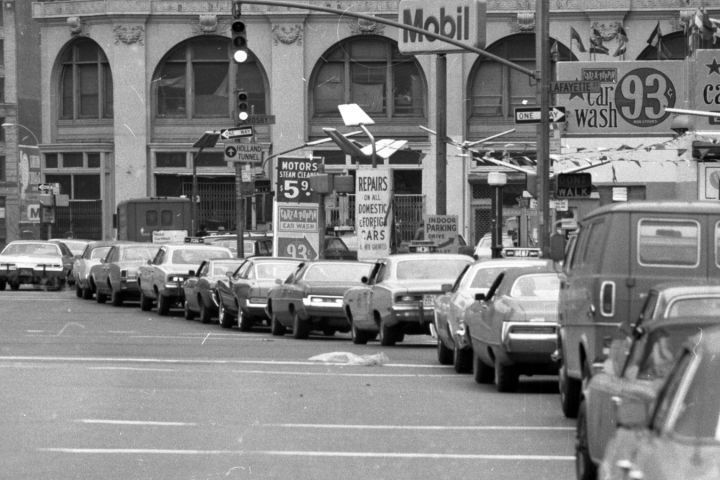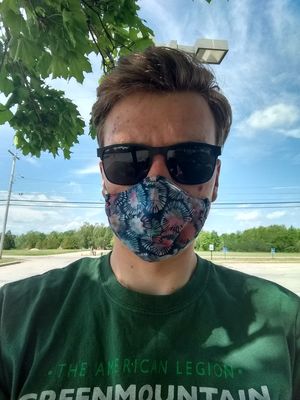
You know what reassures me “in these uncertain times”? When a bona fide adult tells me that the coronavirus is the biggest global crisis they’ve ever lived through. It’s consoling to know that this is unlike anything world has faced in a long time.
“What about the oil crisis in 1973?” I once asked my parents at the dinner table, 20 minutes after taking a final exam in my bedroom. They shook their heads.
I know, I know, silly question. How could long lines at the gas pump compare to the global tragedy of COVID-19? But for some reason, it’s an image from that event that keeps flashing in my mind: cars piled up at a gas station waiting for fuel. I saw it in my old U.S. history textbook.
I’m sure the book had photos more grotesque than a queue of Chevrolets, but to me no other image captures the visible upheaval of everyday life from that moment in time.

As cliché as it is, “the new normal” does describe perfectly our conception of the immediate future. Our world has suffered a tremendous wound and it’s appropriate to expect some scarring, a trace of what has occurred, imprinted on society. History, you might call it.
This truth became clearer to me when I was tested for COVID-19. I just moved from my home state of Vermont to western Massachusetts; two areas that experienced relatively mild coronavirus outbreaks. However, because I couldn’t perform the state-ordered 14-day quarantine upon arrival in Massachusetts for an internship, I decided to visit one of Vermont’s free pop-up testing sites for asymptomatic people before I left. You sign up online, show up and receive your results within a week — sooner for positive results.
My testing site was Vermont’s only real megachurch. It’s not very “mega,” but neither is Vermont. I parked my car, put on my mask and joined the line of 30 or so people — all six feet apart — sloping down a hillside toward the multipurpose center where tests were administered.

The first thing I noticed was the woman in front of me and I had the same cloth mask. I caught her eye and quipped, “Nice mask.” Or at least I tried to. It probably came out, “Mnuhssuh muhmmsk.”
“Mnuh?” she asked politely.
After another attempt with more careful enunciation, I conveyed my point. We proceeded to have a friendly conversation — with not a few requests for someone to repeat themselves — as the line grew shorter.
The friendliness continued as I entered the testing center. Two people in masks greeted me, confirmed my registration and sent me to a National Guardsman in a hazmat suit. His name was Justin. He asked if I had received a nasopharyngeal swab before. I answered no. He procured what looked like a long Q-tip and told me, “it’s just like drinking a tall glass of water,” before sticking it so deep in my nose it jostled my brain out of position. Well, that’s what it felt like. Maybe if he had said, “It’s like drinking a tall glass of water but it will all go directly into your nose and shut off your brain for four seconds,” I would have been more prepared for a nasopharyngeal swab.
The discomfort retreated quickly. By the time I took a quick mask selfie, tweeted about my experience and climbed in my car to drive home, any remaining pain had disappeared.
The surreal feeling did not fade away. On a microscopic level, everything about it seemed normal; I had a pleasant chat with a stranger and soaked in some sun while waiting in line. But zooming out and assessing the experience leaves me almost frightened. I’d never seen a line of people in masks, or had a soldier in a hazmat suit take a swab from my nose, but it felt familiar. Instead of being tested during a deadly pandemic, I could’ve been waiting for gas in 1973.
Did those drivers realize they were living history? Would it have given them a sense of purpose while waiting in that line to know that teenagers decades later would study and doodle on their black-and-white vehicles? When the eyes of history are watching you, whether waiting in a church gymnasium or a two-door sedan, what do you do?
I tested negative, by the way.
Jack Lyons, a rising senior and former intern for this magazine, is working this summer for The Berkshire Eagle in Pittsfield, Massachusetts.